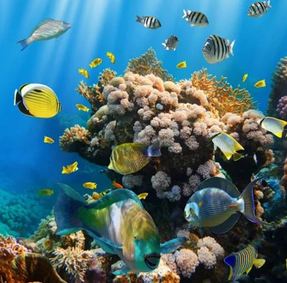
In adult life, beyond formal education, our learning, development and achievement emerge from the circumstances of our lives often in an unpredictable and unplanned way. Over the last few years I have become deeply interested in the way in which we inhabit and interact with the world and the way our learning, development and achievement emerges through these interactions. I have come to see this process as ecological in nature and I have become so attached to the idea that I spent six months working on a book called 'Exploring Learning Ecologies'(1) and I now need to gain feedback on whether the way I have come to see an ecology for learning, developing and achieving has value to people who are involved in helping people learn.
Ecosystems & ecologies
In the natural world, every organism inhabits an ecosystem which comprises the complex set of relationships and interactions among the resources, energies, habitats, and residents of an area for the purpose of living. Each organism within an ecosystem has its own ecology within the ecosystem interacting in its own unique way with its environment and the other inhabitants, seeking and using particular resources and forming particular relationships with the materials and events in its world.
Human beings are no different. We inhabit our own ecological (ecosocial) system which comprises the set of relationships and interactions among the people, resources, energies, habitats, and other residents of the particular environments we inhabit for the purpose of living. Where we are different to all other organisims on this planet is in our ability to learn and develop through this learning and to pass on this learning to other members of our species. Learning is therefore one of the most important dimensions of our ecology for sustaining and enhancing our life and the concept of a learning ecology provides us with the means to visualise the dynamics of complex self-determined and self-organised learning process and appreciate how the different elements of the ecology - contexts, process, will and agency, relationships and resources, fit together in a particular set of circumstances.
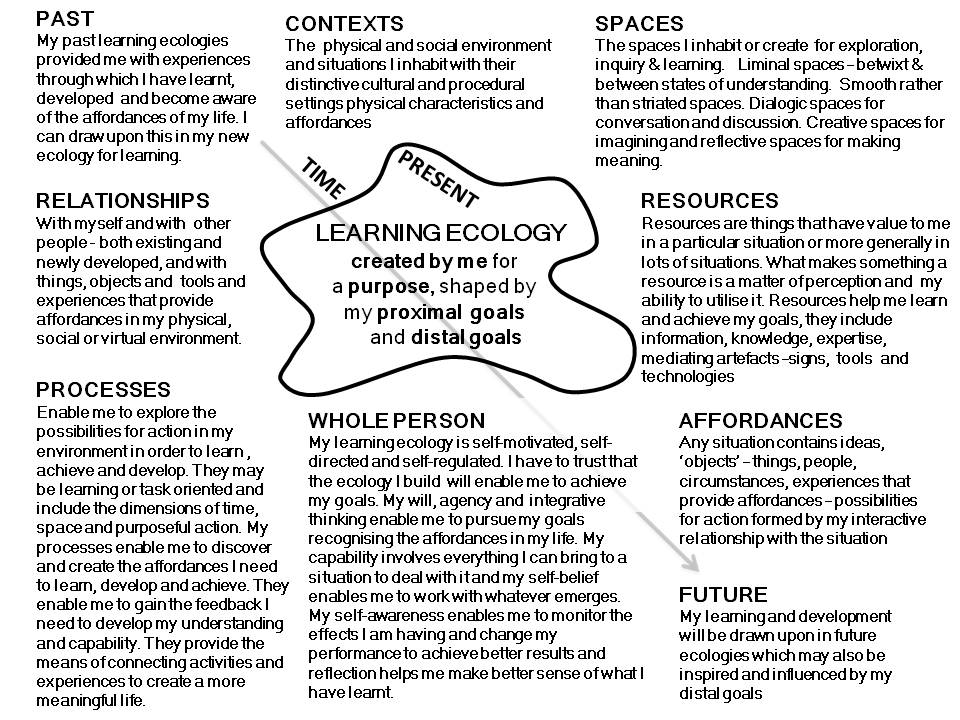
The proposition I'm developing is that an individual's self-created learning ecologies grow from the circumstances (contexts and affordances) of their life and they are established for a purpose that is directed to accomplishing short term (proximal) goals connected to more distant (distal) goals or life purposes. Their learning ecologies include their processes, activities and practises, their relationships and networks, and the tools and technologies they use, and they provide them with the opportunities, experiences, information, knowledge and other resources for learning, developing and achieving something that they value (Figure 1 & 2).
Figure 1 Components of a learning ecology (1)
Our learning ecologies are the means by which we connect and integrate our past and current experiences and learning. They embrace all the physical and virtual places and spaces we inhabit and the learning and the meaning we gain from the contexts and situations that constitute our lives. Our learning ecologies are the product of both imagination and reason and they are the vehicle for our creative thoughts and actions. They are one of our most important sites for creativity and they enable us to develop ourselves personally and professionally in all aspects of our lives.
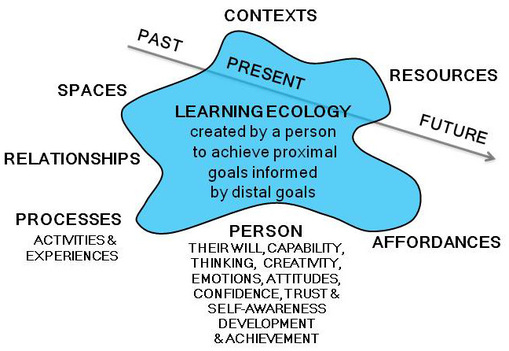
The perpetual challenge facing all human beings is fundamentally adevelopmental challenge focused on problems like 'learning to deal with and make the most of the situations, resources and opportunities in our lives' and 'solving the problems and challenges we encounter day to day'. There is also a developmental challenge emanating from within, 'how can I be and become a better human being.' These two forces, one intrinsic the other extrinsic drive our motivations which lead to us creating ecologies for learning, developing and achieving. These forces involve us in the continual process of becoming different which invariably means learning new things by adding to existing knowledge or skill, or replacing something which we already have. In this way development is integral to our daily project of perpetually becoming.
Figure 2 Simple conceptual tool for evaluating the components of an ecology for learning and development (1)
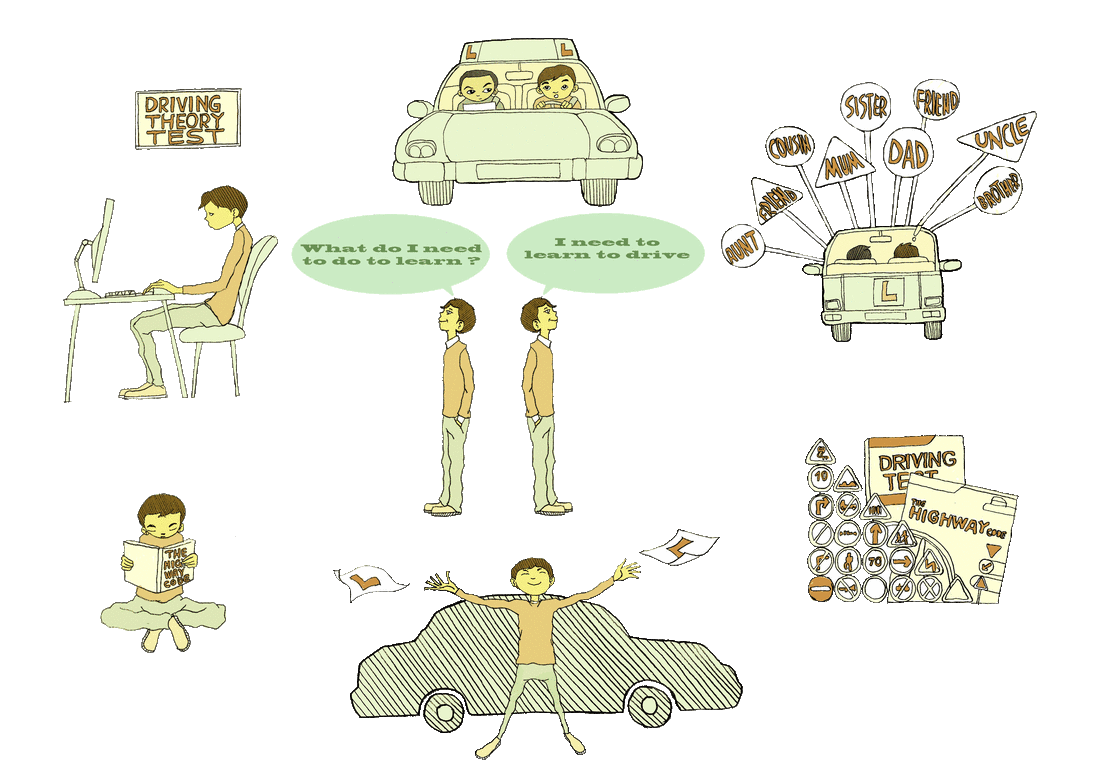
Our ecologies for learning, developing and achieving are revealed in the narratives we tell about our significant learning and development projects and events. Our projects come in all shapes and sizes, and in all contexts. We might illustrate the idea of an ecology for personal development through the scenario of learning to drive a car (Figure 3) an important learning project for most young adults. The scenario involves the learner in a comprehensive and mainly informal way interacting physically and emotionally with his environment in order to develop the knowledge, awareness and practical skills to drive competently and safely.
The process begins when the learner decides they want to learn to drive(motivation/will) and take the test to demonstrate proficiency (proximal goal). Consciously or unconsciously their desire to drive will be embedded in the idea of a better and more productive life (distal goal). The individual has created a need and they must perceive and find the affordances available to them in their environment in order to meet this need. The individual, often with parental guidance and support, creates processdrawing on the affordances in their existing ecosocial system, to learn and develop themselves in line with their objective. The ecosystem they create includes context, resources, relationships and an unfolding (emergent) process over a significant period of time.
Figure 3 Personal learning ecology created in order to learn to drive a car and pass the driving test. Includes my context, affordances and process for learning to drive, the contexts in which I learn to drive, and a set of relationships and resources that enable me to learn.
Typically, the process involves:
- several months of dedicated activity reading, practising, discussing, observing,
- access to a car so they can practise
- access to information about driving and the rules of the road - either as a book/booklet, DVD or on-line resources
- a range of driving instructors including a trained professional instructor and untrained family members and friends
- physical environment - safe areas for practising - like empty car parks and quiet roads - then public highways with various traffic conditions
This example of an ecology for learning shows the learner seeing and using the affordances they have to learn to drive in their particular context - their social, physical and virtual environment. They formulate a specific goals - to learn to drive and pass the test to become a qualified driver. Their self-determined learning process may well be aided by a professional instructor but the learner also draws on resources available for learning in their own environment - the knowledge and experience of people they know (relationships) - family and friends. As they practise driving they are immersing themselves in situations that are relevant to their learning and developing their own case examples of situations they encounter on different sorts of roads in different sorts of driving conditions. The experience is rich in emotion (I experienced some today as I accompanied my daughter who is learning!!) which helps anchor their learning in memorable moments and incidents. Over time experience is accumulated in a range of contexts - road, traffic, day time/night time and weather. As they participate in this process they can tap into the experiential knowledge (resources) of the people who accompany them on journeys as both drivers and passengers and their new awareness also encourages them to be more observant as a passenger so that they begin to think like a driver, reading and anticipating situations even when they are not driving. The conversations they have about their experiences will also encourage them to reflect and learn through this process. This ecology aimed at becoming a competent driver - may last several months and perhaps involve 10's or 100s hours of time and effort in which learning and its embodiment in their driving practise is the primary goal. If they are not successful in their test they will experience and feel failure and have to overcome this as well.
Through their learning ecology a person will gradually master a body of procedural and experiential knowledge and practical skill and embody this knowledge in their driving and eventually reach the standard to pass the test. Their learning, development and achievement have emerged from their interactions with their everyday environment and the circumstances of their life and the idea of a learning ecology embodies all these things.
What's the point?
The point of any idea is in its value. Does the idea convey meaning that is useful, that helps us understand, appreciate or explain something - in this case the idea is offered as an explanation of how we learn. If it does can we use the idea to help us design/create better educational practices and help learners become more effective in working with the complexities in their lives. In developing an idea like a learning ecology I'm trying to give the ecological metaphor new meanings that are relevant to learning, education and personal development. But its one thing to persuade myself that an idea has meaning and quite another to persuade other people. Its my belief that the idea of a learning ecology holds different value for different audiences.
Firstly does it hold conceptual value? Does it help us as visualise the dynamics of a complex self-determined and self-organised learning process and appreciate how the different elements of this process fit together to achieve a goal. Does it provide a framework for helping us think and act in a more relational and connected way - an ecological way of thinking perhaps.
What is its value for learners? Does the concept encourage us to see learning as a process and appreciate the ways in which we create processes that utilise and develop the relationships and resources we need in order to do what we have to do in order to accomplish the things we need to do?.
What is the value for teachers? Does the concept open up new possibilities for contexts, relationships and interactions as we appreciate that the learning ecologies of learners' extend beyond the ecology we have created for their learning and development? Does it encourage us to design educational challenges in ways that encourage learners to develop their own ecologies for learning?
What is the value for universities? Does the idea conflict with the ways we approach teaching, learning and the provision of educational resources and opportunities or does it open new possibilities for our imaginations and activities that we can utilise to enable us to become more involved in the ecologies of learning, knowledge development and creativity?
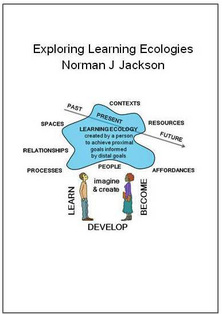
I welcome feedback on the ideas I have set out in my book Exploring Learning Ecologies and the educational value in these ideas. You can email me at [email protected] All proceeds from the book are used to support Lifewide Education.
Sources
1) Jackson N J (2016) Exploring Learning Ecologies Chalk Mountain https://www.lulu.com/
2) Lifewide Magazine. Several issues on learning ecologies. Free to download at http://www.lifewideeducation.uk/magazine.html
 RSS Feed
RSS Feed
